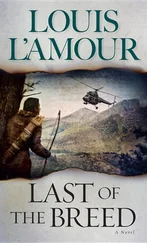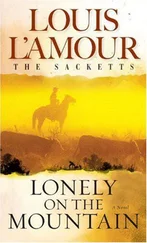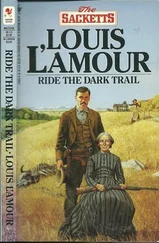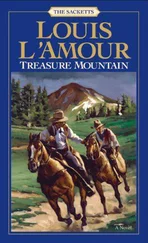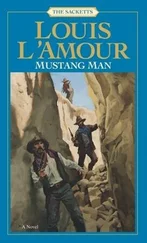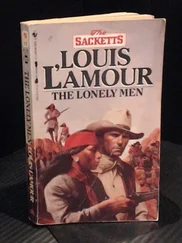Sitka
Louis L'Amour
*
Chapter 1
Jean LaBarge stopped beside the trunk of a huge cypress, scanning the woods for Rob Walker. By this time Rob should have reached their meeting place by the Honey Tree, so after only a momentary pause, he started to go on his way. Then he stopped abruptly.
The woods were very still. Somewhere, far-off, a crow cawed into the stillness, but there was no other sound except the faint murmur of wind in the high leaves. The boy felt his heart begin to pound heavily.
In the leaf mold just beyond the cypress was a boot print, its toe pointing southward into the deeper woods.
At fourteen Jean LaBarge knew the track of every man in the small village closest to the swamp, of the farmers who worked the fields nearby, and even the occasional cattle drovers who traveled the road along the swamp's edge. But this was the track of a stranger.
Sunlight filtered through the leaves and dappled the forest with light and shadow. No breeze stirred more than the topmost boughs, for at this place, deep within the Great Swamp, all the wind was shut out, as were the sounds. In this place one found oneself walking with stealth, moving in these lonely, secret woods as one might have moved in the days of the earth's first awakening. Under the feathered hemlock, beside the stagnant pools, upon the spongy, moss-green earth there was no movement but the flight of some small bird, or a butterfly on wraithlike wings suspended for an instant in a shaft of sunlight. Only the green golden twilight of the forest, only the rustling of a tiny animal among the leaves. This was a place lost, remote, unvisited, and this was home, the only home he had known since his father went to the far lands beyond the Mississippi, and his mother died.
No townsman came to the Great Swamp, nor used the trail through the deserted valley beyond, the trail known as the Shades of Death. Not many years before, during the War of 1812, soldiers had been ambushed here by Indians, and in both earlier and later years men had disappeared from that trail, leaving no evidence to explain their going. The old trail was grass-grown now, forgotten by outsiders, and the village people when passing either did not look at all, or darted hasty, half-frightened glances into the green, cavernlike silence. In the Pennsylvania villages along the nearby Susquehanna they believed the ghosts of dead soldiers marched endlessly here, mourning for homes to which they would never return.
The Great Swamp was a land untouched by plow, as lonely as upon the morning of the world's birth. Here was no columned corridor of mighty trees, no majestic avenue, but a dim, murky, silent place, dark even at noontime, shadowed except in the rare clearings or above the stagnant pools where lilies lay empty-eyed in the stillness, or forested themselves with cattails, or veiled themselves with green scum. A tossed stone into such a pool gave off few ripples, more the sodden gulp of something swallowed in darkness. One of the soldiers who survived that long-ago march spoke of it as "a horrid, rough, gloomy country." Yet there was life in the swamp, life other than the birds and small animals. Throughout the swamp and in the rugged highlands that backed it there were squirrels, muskrat and mink, but there were deer, wolves, panthers and black bear, also.
Where Mill Creek Road divided the world of people and farms from the jungle of the swamp, it also divided the world of Jean LaBarge, divided the one he visited from the one in which he lived and where he was wholly himself. The swamp had been his first playground, and since then a school as well, and source of a precarious living.
Beside the cypress he waited, listening. The forest is a place of silence yet it has its own small sounds, the sounds a hunter knows. A wind stirring among the branches, the creak of boughs, the drop of an acorn or a pine cone, the movements of small animals ... these sounds Jean knew and his brain accepted, catalogued and ignored, tuning itself for only the unfamiliar sound, the movement unnatural to the forest.
The man whose track he had seen was large, for the stride was long and the indentation left by his boot was deep, and he was a man not unaccustomed to woodland travel. This much became obvious as Jean followed along the trail the man had left, noting where he stepped and how he moved. Moreover, the man was neither hunting nor wandering at random, but moving directly toward some known objective, and his direction was generally south. Nobody knew the swamp as Jean did. He had grown up on a small farm at its edge, and before his mother died he had come regularly to the swamp to help her collect the herbs she sold in the village. Now that she was gone he continued to gather herbs and take them to the village to sell to old man Dean. Jean was a tall fourteen, a slender boy with large dark eyes and a shock of curly, almost black hair. Already his shoulders were broad, although his body was painfully thin. There was more than a hint of the man he would become in the size of his frame and the easy way he moved. Growing up in the forest he had early learned to move as silently as would a fox or panther. After his mother died his Uncle George had come to work the small farm, but Uncle George was a good-natured, gregarious man who liked people and hated the loneliness of the cabin. Moreover, he disliked work as much as he enjoyed loafing and idle talk. The boy accepted his coming, and when one day Uncle George failed to return from one of his longer absences, he accepted his going. Left alone in the cabin Jean carried on as always; there was nothing else to do. His uncle had gone but once to the village where Jean sold most of his furs and herbs, and his disappearance caused no comment: there were several villages within easy walking distance of the swamp, and he might be frequenting any one of them. Jean, a lonely, self-sufficient boy, had common sense enough to tell no one that his uncle had deserted him. The boy's coming and going had long since been taken for granted in the towns; and no one ever believed--or very much cared--that he was alone.
Of his father he remembered little except what his mother told him, that he had gone to the western mountains to trap and hunt, and that he would return eventually. To Jean he remained a vague, shadowy figure, bearded and in buckskins, who smoked a pipe and seemed always in a good humor. From time to time Jean heard mention of him in the villages, for he was that most fabulous of persons, a mountain man. And he was what Jean wanted to be. Jean LeBarge had no friend but Rob Walker. To the village people he was the son of "that gypsy woman" and the way he lived was regarded with suspicion by the mothers of tamer sons who wanted them kept tame, and felt that his might be a dangerous influence.
The other children of the village despised him as a poor boy and the son of a gypsy, and admired him because he lived in the dreaded and fascinating Great Swamp. To the children of the village Mill Creek Road was a boundary they had been warned never to cross. Not even the village men ever hunted in the swamp: game was, after all, plentiful along the fences, and much easier to get than in the depths of the swamp--where a man might easily become lost or disappear in the treacherous sinkholes.
There was no reason for any stranger to be in the Great Swamp, so far from the road. But this was a stranger who seemed to know exactly where he was going. It had been four years since Jean had seen any man's track in the swamp ... and then it was rumored that one of the Carters had returned to the country from which they had been driven.
To Rob Walker the swamp had been a dismal, frightening place, for he knew that even the older men, including his father, hurried along Mill Creek Road at the approach of darkness, and not without reason.
Читать дальше

